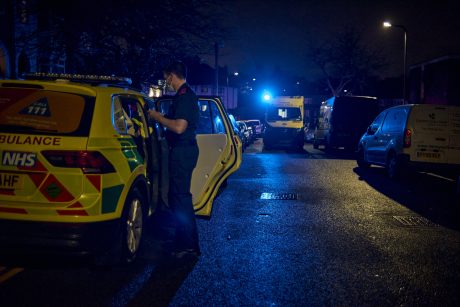London paramedics to help reduce risks of chemsex
London Ambulance Service is introducing measures to reduce the risk of harm for people who engage in “chemsex” as new data shows that paramedics treat an average of one person a day from the effects of ‘hook-up drugs’.

The data collated by London Ambulance Service (LAS) estimates that, since January 2021, paramedics in the capital have treated at least 764 people from intoxication from substances associated with “chemsex”, such as crystal meth or mephodrone.*
This includes people suffering from drug-induced psychoses, overdoses and difficulty in breathing, as well as people experiencing the physical and mental effects of the use of chemsex-related drugs.
Chemsex is prevalent amongst a sub-group of London’s LGBTQ+ community, where participants use drugs such as crystal meth, mephedrone (known as ‘m-kat’) and GBL/GHB to prolong sexual encounters.
It presents a range of health risks including substance intoxication, sexually transmitted infections (STIs), trauma, problematic drug use, and even death from overdose.
The growing popularity of the phenomenon in the capital has prompted London Ambulance Service to partner with LGBTQ+ voluntary sector agency Gay Men’s Health Collective to roll out non-judgemental harm-reduction measures.
Peter Kingsley, LAS Advanced Paramedic, who is leading the project, said:
“Chemsex is a secret world. The people we care for following a chemsex incident often lead very conventional lives outside of these meet-ups and don’t disclose their engagement in chemsex to anyone, including their GPs. This risks their health conditions going untreated and physical and mental health deteriorating.
“The ambulance service is the only part of the NHS that routinely cares for chemsex participants in the place where these meet-ups are happening.
“London paramedics and mental health teams are uniquely placed to intervene with non-judgemental health advice and reconnect these people with the rest of the health and social care system.”
From this month, London Ambulance Service’s advanced paramedics, mental health teams, and medics in fast-response cars will be handing cards to those at risk which include educational resources and organisations offering physical and mental-health support.
The cards include a discrete QR-code that patients can access in their own time to consult a comprehensive bank of resources on drug addiction, treatment services, and safer sex advice.

Meanwhile, ambulance crews dispatched in central London – where chemsex is most prevalent – are being trained to recognise symptoms of chemsex drugs and educated on how to sensitively care for these patients.**
Patriic Gayle, Co-Founder of Gay Men’s Health Collective, said:
“The cards we have created are a gateway to helplines and support services.
“There can also be stigma and denial associated with chemsex when things go wrong, so using the card to reach out is a step to processing what has happened and what it means.”
The chemsex harm-reduction project at London Ambulance Service was born out of a close collaboration between Advanced Paramedic Peter Kinglsey, Mental Health Consultant Nurse Carly Lynch, Mental Health Paramedic Lead Daniel Phillips, and Co-Founder of Gay Men’s Health Collective Patriic Gayle.

Follow us on social media: